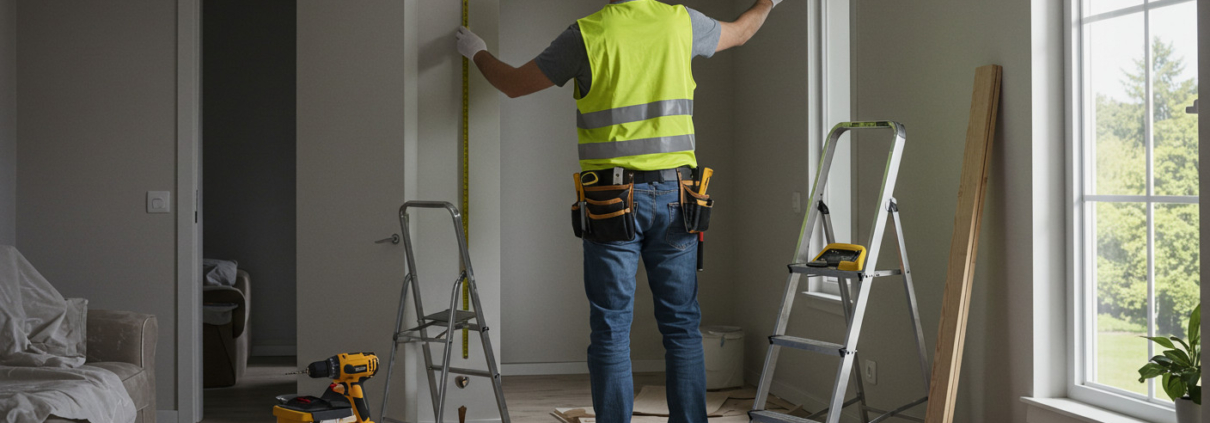How to Become a House Renovator
Many who seek to become house renovators ask this question as they perceive this as the ideal career where one draws a good salary. Renovating houses is not just about patching up walls and painting rooms; it is all about a vision, understanding the technical facts, and business acumen. Some people consider it an investment with a high potential of making a profit; others, however, stay back due to issues of money, laws, and competition.
The question that may arise in the mind of an individual who is planning to pursue this career is whether it is worth the time or not, and the answer is that, with the right approach, it is worth it. The house renovator job provides unlimited possibilities for generating money, ingenuity, and fame. Without the proper preparation, however, going into this area may result in a waste of money and disappointment. This is why we are going to answer this question and reveal useful steps, expert advice, and insider knowledge to succeed.
The Reasons as to Q&A: Why Become a House Renovator?
House renovation as an industry is expanding and has a constant demand. Here’s why:
Good Profit Earning
Renovators can purchase old-fashioned houses and renovate them, making a profit by selling.
Creative Freedom
You can create, redesign, and revive spots.
Personal Growth
Renovation provides learning about negotiation, management, budgeting as well as problem-solving.
Market Demand
There is a constant need as people turn to property values that are increasing sturdily, coupled with urbanization, and turn to renovation experts.
This gives a competitive and interesting career in house renovation.
Step 1: Understand the fundamentals of the renovation
The most basic skills in learning how to be a house renovator are the following: These are carpentry, plumbing, electricity work and interior designing, and project management. Although you do not have to be an expert in everything, you should familiarize yourself with their operations so that you can hire and coordinate the work of skilled persons.
Begin with short courses or apprenticeships. There are also numerous home improvement and construction courses in local community colleges, and online teaching programs that allow students to choose lower-cost programs. In addition, learning how to read plans and use construction takeoff and estimating services early can help you understand budgeting and material requirements more effectively. By practicing with these services, you can calculate how much material is required for a particular job.
Step 2: Certification & License
Compliance is needed in law. You must get:
- A general contractor’s license
- Safety credentials (OSHA, First aid, etc.)
- Inpatient trade licenses (if you will be doing electrical or plumbing yourself)
Failure to go through this process may result in fines, lawsuits, and the stoppage of projects. A certified renovator also draws the trust of the clients and the investors a lot.
Step 3: Get Real-Time Awareness

Online courses/books won’t replace practical experience. To work under an established renovator or construction company:
- Know project schedules
- Know budgeting errors
- Get to know real customer expectations
Even when you want to enter the world of renovating, you should consider helping some of the veteran ones, as you can gain preliminary experience of what to expect.
Step 4: Prepare a Business Plan
House renovation is not only about repairing houses; it is also about a successful business. A definitive plan assists you in being ahead of the competition. In your strategy, include:
Target Market
Upscale homes, rental, or low-priced refurbishment work.
Budget Projection
Estimates of expenditure of labor, materials, permits, and marketing.
This is done through social media presence, involvement with real estate agents, and word of mouth.
Differentiation
This is another element to inspire the clients: What is it that makes you better (green solutions, quick support, contemporary style).
Including financial forecasting will also ensure that it is easier to attract investors or get loans.
Step 5: Estimate Costs and Control Projects

Mismanagement of cost is one of the greatest errors that a new renovator will make. Improper estimations may dip into the fiscal and ruin the image. It is in these areas that quality planning tools and services should be used.
Many depend on construction estimating services to put accurate budgeting in place because these services assist you in calculating the material, labor, and time it will take. With these tools, the projects will remain on schedule and within the budget.
Step 6: Self-Marketing
A good renovator is not only good but visible. Marketing assists you in acquiring and expanding your reputation on projects. These are tested code examples:
- Create a professional website featuring previous work
- You may use Instagram, TikTok, and YouTube to post before and after transformation images.
- Include testimonials and reviews from satisfied customers.
- Become connected to real estate agents, property investors, or architects.
Bear in mind that customers will be more tempted to hire a person they know and trust.
Step 7: Be on top of Industry Trends
The remodel industry is ever-changing with new materials, technological changes, and design changes. This will make you stay ahead of the rest through updating. For example:
- Smart Homes: Introduction of automation and energy efficiencies.
- Eco-Friendly Designs: Constructing with environmentally friendly materials and solar options.
- Minimalism and Modern Styles: The requirement of younger home-owners.
Being able to continually upgrade your skills will contribute to long-term growth.
The Major Problems Of House Renovators

Although enjoyable, this profession is not free of problems:
- Large Competition: There are a lot of entrants in the market.
- Budget Risks: It does not take much to lose thousands.
- Legal Concerns: Contracting without the necessary permits or licensing results in fines.
- Time Management: Renovation projects are quite prone to delays since they may be hindered by weather conditions that withhold supplies.
Interest rates are just some of the obstacles that you can face, but through advance planning and the information that can be received through industry experts, there is an ability to overcome them.
Conclusion
Becoming a house renovator is a process, and it takes time, ability, and tact. Learning the rudiments of construction, honing a good business strategy, and wielding the latest estimating software tools are all key to a prosperous future. Although it has some competitors and financial constraints, the potential in this sector is enormous for those prepared.
When you are a creative individual who also likes profitability and growth, then house renovation may just be your ideal career. Start small, never stop learning, and position yourself as a professional in the thriving industry.
Frequently asked questions (FAQ)
1. What is the duration of attainment of the profession of a professional house renovator?
It can take 2-5 years of training, certifications, and experience. Individuals who take apprenticeships or structured courses are able to start quickly
2. Does this require a license in order to work as a house renovator?
It is required in most states/countries that a general contractor obtain a license and have safety certifications. Before you start, you should always inquire about your local regulations.
3. Can I begin to smartly renovate houses without previous experience?
It is dangerous, but you can. It’s best to work under a pro or minor do-it-yourself projects before attempting a major renovation.
4. How much can a house renovator earn?
There is a great variation in earnings. An entry-level renovator may earn $40,000 per year, or more accomplished decorators and owners can earn more than $100,000 per year.









Leave a Reply
Want to join the discussion?Feel free to contribute!